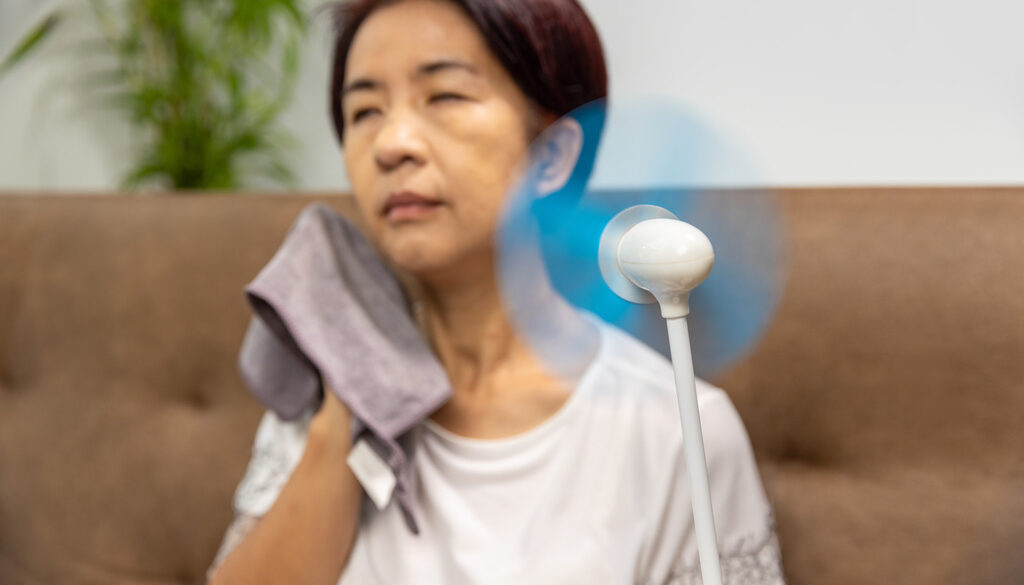5 Signs of Menopause That You Should Know
Some women may be anxious about menopause (sometimes referred to as “the change.”) They may be worried about symptoms such as hot flashes or night sweats. Others may look forward to relief from painful periods and the concern over getting pregnant. No matter what your outlook on menopause, we want you to know that this is a natural stage in a woman’s life.
However, there are several signs of menopause of which you should be aware. We’ll review those and discuss some of the treatment options to help relieve you of symptoms.
What Are the 5 Main Signs of Menopause?
1. Irregular or Lack of Periods
Perhaps one of the most prevalent signs of menopause. Technically, you’ve officially entered menopause if you’ve gone for 12 months without a period. While menopause can occur in your 40s or 50s, the average age of onset among American women is age 51.
During perimenopause —the time before reaching menopause—you may skip periods or have shorter cycles. However, it’s important to realize that as long as you’re having periods, even irregular ones, it is possible to get pregnant.
2. Symptoms of Hormonal Changes
After menopause, the level of estrogen in your body decreases. Once this occurs, you could have the various telltale symptoms and signs of menopause. These include:
- Hot flashes
- Night sweats
- Sleeping problems
Often, there are a lot of options to help menopausal symptoms, including some lifestyle adjustments that can go a long way toward easing menopausal symptoms.
3. Vaginal Dryness
During menopause, the vaginal tissue grows thinner and drier. This can lead to constant discomfort and irritation. While this affects roughly half of all postmenopausal women, as many as 90 percent won’t seek symptom relief or treatment, according to information from Harvard Medical School.
A chronically dry vagina can be a sign of vaginal atrophy and one of the signs of menopause. It can make sex uncomfortable or even painful.
With help, this is easily treatable. We encourage you to contact us so you can avoid the frustrations of dealing with a dry vagina.
4. Mood Changes
Hormone fluctuations can affect your mood. It’s not unusual for postmenopausal women to experience:
- Irritability
- Anxiety
- Forgetfulness
- Depression
- Difficulty concentrating (“brain fog”)
We want you to understand that your mental health is as important as your physical health, and if you are experiencing these signs of menopause—particularly if they are to the point that they interfere with your day-to-day life—we encourage you to seek help from a mental health professional.
5. Weight Gain Due to Slowed Metabolism
It’s the ugly truth: Menopause can slow your metabolism. Your hormones may also affect your appetite, making it more difficult to manage portion control.
Obesity can lead to a host of health problems, putting you at risk for conditions such as Type 2 diabetes, heart disease, high blood pressure and strokes. We’ll work with you to guide you through this challenging time and help you reach your weight and fitness goals.
How Are Signs of Menopause Treated?
There are several treatments for menopausal symptoms, and we tailor our health care plan to address your individual situation. This can include:
- Complementary and alternative medicine
- Nonhormonal prescription medications
- Hormone replacement therapy
You can read more about these potential treatments in detail in our earlier blog: “The Most Effective Menopause Treatments.”
Our OBGYNs in Chapel Hill and Durham Serve You Throughout Your Life Stages
We have been consistently ranked as the top OBGYN practice in the Triangle area. We’re dedicated to our patients and treat them as individuals—we understand that no one course of care is right for everyone.
If you believe you’re entering menopause or you’re having difficulties with menopausal symptoms, we encourage you to schedule an appointment with us.




